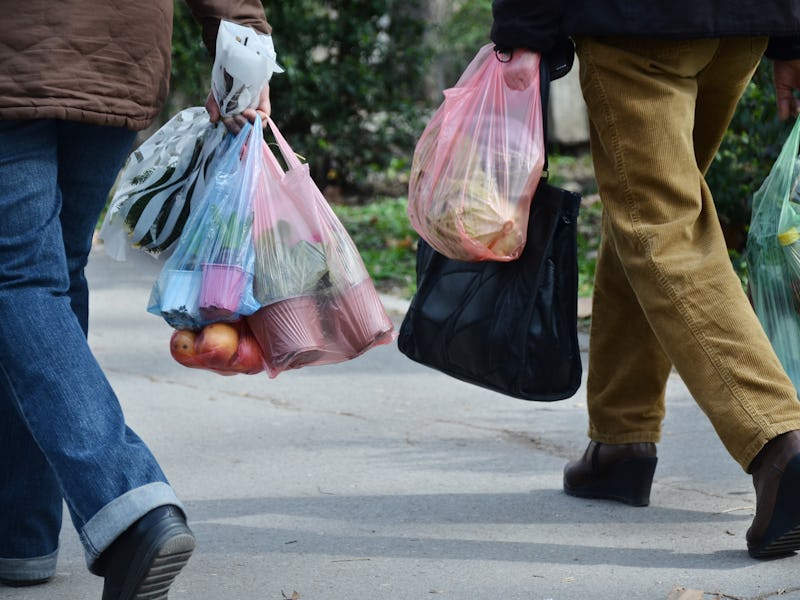Where to recycle plastic bags near you? Your guide based on where you live
These ubiquitous plastics can not go in your bin a home. But recycling them is not impossible.

Even if you make every effort to use a reusable grocery bag, we will all inevitably shop without it at least once — and take home a plastic shopping bag along with our wares.
These things add up quickly. For such a ubiquitous and significant source of plastic, it is almost ironic that plastic bags cannot go in standard plastic recycling bins. But where there is a will there is a way, and Inverse has the solution.
This is how you recycle your plastic bags.
The flimsy material used for bags is processed differently to rigid plastic containers, like shampoo bottles and milk jugs. That is why lower-density plastics cannot go in your household recycling bin. And though it might be tempting to toss them in with your recycling anyway, please do not do this. Plastic bags can gunk up recycling systems and cause machinery to malfunction, hurting the entire process.
Instead, you need to bring your bags to a specific location — a recycling collection facility.
Where can you drop off plastic bags to be recycled?
Several websites can help you locate the closest recycling collection facility or drop-off point. They also provide information about what kinds of plastic should and should not be included.
Plastic Film Recycling has a tool to help you locate stores and recycling centers in your area that accept plastic bags and film.
On the website, you can type in your zip code and see a list of nearby locations. All you need to do is build a stop in to your commute or weekend walk. Simple.
What materials can you drop off?
While most plastic bags and some plastic wraps can be recycled at these drop-off points, not everything will make the cut. That is because different plastics have different chemical compositions — some of which can affect the overall recycling process.
The website How 2 Recycle explains which plastics can be recycled at a store drop-off along with your plastic bags.
Here are the plastic goods you can drop off:
- Bags: Grocery, produce, newspaper, sandwich, bread, and some cereal bags are all fair game.
- Wrap: The stretchy kind that you find around packs of paper towels, soda bottles, or diapers can go in.
- Pouches: Plastic pouches, like the white ones Amazon sends for smaller objects, are also kosher.
- Air pillows: Like that used to cushion packaging, can be added.
- Dry-cleaning covers: Offset the emissions from dry cleaning slightly by recycling the bag you get your clothes back in.
What materials shouldn’t go in the plastic bag recycling?
Unfortunately, these materials cannot be recycled at the drop-off points:
- Clinging plastic wrap: Like the rolled kind you might use for food.
- Bags used for salad: Like one your spring mix comes in, sorry sustainable-diet eaters.
- Candy wrappers: No chocolate bar wrappers or Skittles packs, please.
- Pet food bags: Same as for human candy, so too for pet candy.
- Compostable bags: Ironic, right? Compost them instead!
Even if plastic materials meet the criteria, if they are dirty or wet and can not be cleaned off or dried, then they can not be recycled. This rule applies to rigid plastic, too.
Make sure any bags, wraps, or films are clean and dry when you drop them off. It is a little extra work, but contamination can render a whole batch of plastic non-recyclable, so if you want to make a difference, it is a necessary step.
In fact, if food residue will not wash off, you are better off throwing the plastic away to landfill.
As for the plastics that can not be recycled? It may not feel good to throw away plastic food wrap, but the website Recyclebank offers a different solution: “The best way to avoid sending cling wrap to the landfill is to limit your use of it.”
Try alternative methods of storing your food — like reusable boxes, or reusable wax cloths.
How are plastic bags recycled?
Once they get to the recycling plant, plastic bags are first broken down into tiny plastic shreds, and then melted into pellets.
From there, the plastic can be reprocessed to create new bags. Alternatively, it may be shipped out and turned into other products, like plastic lumber.
There are some other, more creative plastic recycling endeavors out there, too. These include turning bottle caps into art, and spinning plastic into clothing, rugs, sunglasses, and even sneakers. As Inverse reported in early February 2020, the clothing giant H&M is in on the trend, spinning unwanted clothes — another major source of plastics — into new ones via an innovative process called "circulose."
Together these efforts, along with using less plastic in the first place, can help push us toward solving the massive plastic problem showing up in every corner of the Earth — including the uninhabited ones.